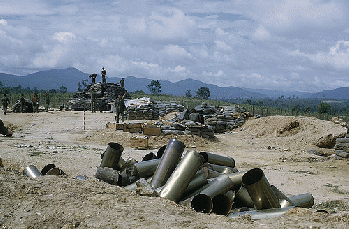The fact that South Korean exports to Vietnam increased by nearly 50% over the first seven months of this year, superficially suggests a further thawing of the two countries' historically frosty relationship, which has for the longest time centered solely on trade and investment. The 2015 bilateral free trade agreement between the two nations has evidently caused business ties to flourish. But trade has merely served to push aside, rather than resolve, a number of underlying bilateral issues that have blighted the countries' ties for many years. While officials in Seoul and Hanoi are quick to talk up the two nations' growing trade links, nothing is said publicly by either on lingering resentment harbored by many in Vietnam over war crimes committed by South Korea during the Vietnam War.
The cruel behavior of South Korean troops through parts of the conflict is well documented. A recently declassified US army report about war crimes committed by South Korean marines between 1968 to 1969, provides a harrowing laundry-list of atrocities, ranging from indiscriminate slaughtering of civilians, including women and children, burning of entire villages, as well as cryptically labeled "unspeakable acts". It is no surprise that those South Vietnamese troops were regarded among the war's most brutal fighters.
One of the most harrowing examples of South Korean war crimes during the Vietnam conflict was the systematic and brutal mass rape of Vietnamese women and girls by South Korean troops. The 5,000 to 30,000 children born as a result of pregnancies caused by these rapes are derogatively referred to as "Lai Dai Han" in Vietnamese, meaning "mixed blood". In a region where ethnic purity is held in high regard, the stigma of rape weighs heavy, a burden that has forced the Lai Dai Han to live as outcasts as they have been shunned in Vietnamese society for their perceived lack of racial purity.
However, despite the widespread acceptance of the fact that these despicable crimes occurred, successive South Korean governments have remained unwavering in their refusal to issue an official apology, or acknowledge any responsibility for the crimes committed, let alone offer some form of compensation for the victims.
To the contrary. Vietnamese rape survivors and Lai Dai Han have long campaigned for an official apology from South Korea, but Seoul has done its utmost to suppress their very existence and erase evidence of South Korean wrongdoing during the Vietnam War from history books. In an audacious display of dishonesty and hypocrisy, Seoul is always quick to highlight the suffering of its own people during past conflicts, but develops a severe case of national amnesia when facing its own crimes in Vietnam.
The closest a South Korean President ever came to pay his long overdue respects happened almost 20 years ago, when former South Korean President Kim Dae-jung was gracious enough to express "regret" (or "condolences" depending on the source) over his country's crimes in Vietnam during a visit to Hanoi. Not that this changed official state policy, however, because since then South Korea has been more than willing to nurture its own national narrative of victimhood.
If that were not enough, South Korea has even actively taken steps to silence those who would speak up for its victims. Unwilling to deal with the consequences of her country's behavior and determined to crackdown on dissent, disgraced former South Korean President Park Geun-Hye introduced an anti-defamation law in 2016 designed to silence critical voices speaking unpleasant truths about the nation's past and present. The South Korean government has a long history of using criminal defamation laws to deal with its critics, be they opposition politicians, journalists or activists.
Many face the threat of lengthy prison sentences and heavy fines if found guilty of disseminating what are regarded "openly false facts". In reality, this translates to anything the government believes the public ought not to know. It comes thus to the surprise of no one that these laws have also been used to silence campaigners and writers calling for South Korea to acknowledge its past wrongs, including the rape and murder of hundreds of Vietnamese civilians during the Vietnam War.
Despite these desperate and shameful efforts to whitewash the past, Seoul is finding it increasingly difficult to sweep its war crimes under the rug. Hanoi is becoming more vocal about the role Seoul played in the wrongs committed against its people, and South Korean advocacy groups have sprung up seeking to hold their government to account in spite of the risks they face for doing so. Indeed, the pressure on Seoul to acknowledge and apologize for its past behavior is rising, and with new evidence of South Korea's crimes emerging some four decades after they were committed, that pressure is only likely to grow.
Still, the Lai Dai Han are unlikely to receive a heart-felt apology soon. Just as his predecessor Park failed to do the honorable thing, so is South Korea's new President Moon Jae-in. In a recent speech marking the June 6 Memorial Day, Moon continued to follow the same pattern of ignorance and denial as the presidents before him when he extolled "the soldiers who fought in Vietnam for their contributions to economic growth in the 1960s and 70s." The backlash in Vietnam was considerable, with the Vietnamese government sending a "first-ever official warning" to Seoul regarding the war crimes.
While it is of course positive that trade relations between Vietnam and South Korea are flourishing, they must not be used to rewrite history. President Moon Jae-in would be well advised to acknowledge and apologize for war crimes committed in the name of his country and give some dignity back to those who suffer to this day. For without acknowledging the past, there can be no bright future.





